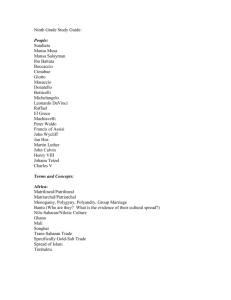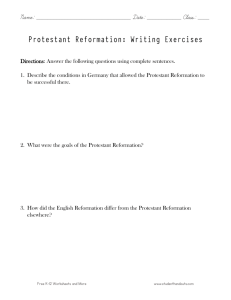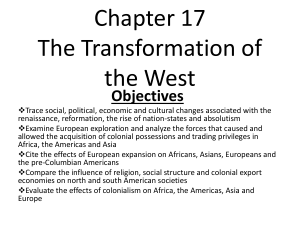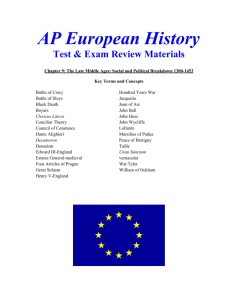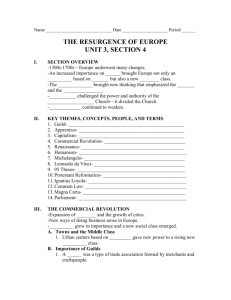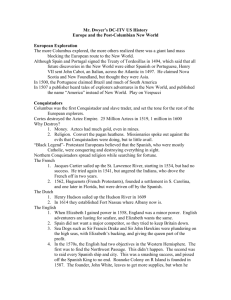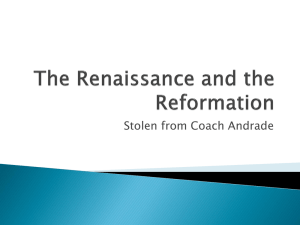AP EURO TERMS
advertisement
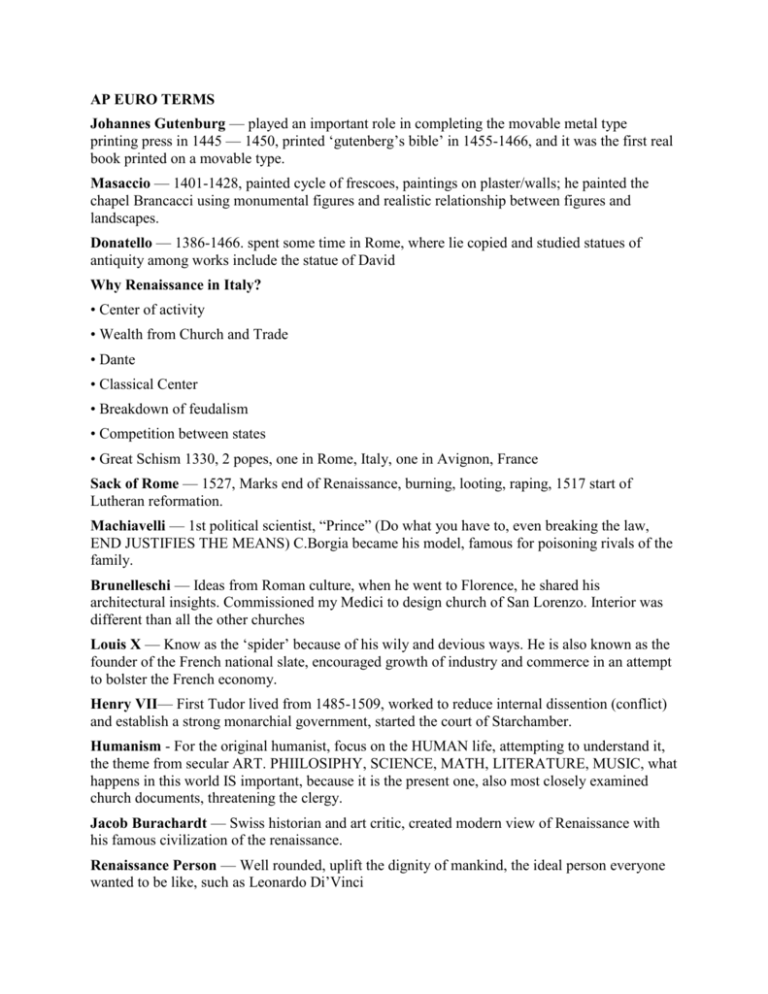
AP EURO TERMS Johannes Gutenburg — played an important role in completing the movable metal type printing press in 1445 — 1450, printed ‘gutenberg’s bible’ in 1455-1466, and it was the first real book printed on a movable type. Masaccio — 1401-1428, painted cycle of frescoes, paintings on plaster/walls; he painted the chapel Brancacci using monumental figures and realistic relationship between figures and landscapes. Donatello — 1386-1466. spent some time in Rome, where lie copied and studied statues of antiquity among works include the statue of David Why Renaissance in Italy? • Center of activity • Wealth from Church and Trade • Dante • Classical Center • Breakdown of feudalism • Competition between states • Great Schism 1330, 2 popes, one in Rome, Italy, one in Avignon, France Sack of Rome — 1527, Marks end of Renaissance, burning, looting, raping, 1517 start of Lutheran reformation. Machiavelli — 1st political scientist, “Prince” (Do what you have to, even breaking the law, END JUSTIFIES THE MEANS) C.Borgia became his model, famous for poisoning rivals of the family. Brunelleschi — Ideas from Roman culture, when he went to Florence, he shared his architectural insights. Commissioned my Medici to design church of San Lorenzo. Interior was different than all the other churches Louis X — Know as the ‘spider’ because of his wily and devious ways. He is also known as the founder of the French national slate, encouraged growth of industry and commerce in an attempt to bolster the French economy. Henry VII— First Tudor lived from 1485-1509, worked to reduce internal dissention (conflict) and establish a strong monarchial government, started the court of Starchamber. Humanism - For the original humanist, focus on the HUMAN life, attempting to understand it, the theme from secular ART. PHIILOSIPHY, SCIENCE, MATH, LITERATURE, MUSIC, what happens in this world IS important, because it is the present one, also most closely examined church documents, threatening the clergy. Jacob Burachardt — Swiss historian and art critic, created modern view of Renaissance with his famous civilization of the renaissance. Renaissance Person — Well rounded, uplift the dignity of mankind, the ideal person everyone wanted to be like, such as Leonardo Di’Vinci Isabella d’Este — Fbarra’s known for intelligence and political stances, daughter of the Duke of Barro. Marquis of Manchua. First lady of the world Machiavelli — 1469-1527, new ideas about political science contrary to popular belief, wrote a book on how to be a ruler, “prince” he thought a good ruler should let his conscience sleep to rule people best. Pico della Mirandola — One of the most prominent magi in late 15th century, wrote “Oration of the dignity of man” and 900 fecesses, sum of all learn for public debate. Studied many philosophers looking for universal truths, God’s revelation to humanity. Uittorino de Feltre — 1378-1446, developed humanist schools for children in Mantua, based his educational system on ideas of classical authors, particularly Cicero and Quintillian. Leo X — Pope from 1513-1521, Julius II’s successor, son of Lorenzo Medici, made archbishop at age 8, cardinal at age 13. Acquired a fine taste of art, manners, and social life among the Florentine Renaissance Elite. Became Pope at 37, commissioned Raphael to do paintings and made humanists papal secretaries. Sacrosancta — was a form of decree passed by the council of constance. It stated that general council of the church received authority from God. And everyone including the pope was subject to its authority. Erasmus — Was a great humanist, witnessed the triumphant entry of Julius II into Bologny at the head of its troops and later wrote indictments of papal proclivity for warfare, Christian Humanist Alex V 1492-1503, Member of the Borgia family, and known for debauchery (immorality), and sensuality. Practiced nepotism by making a son, nephew, a brother of a mistress cardinals. Lollards — English Lollardy was a product of the Oxford theologian John Wycliff. who despised the Catholic Church’s corruption. At one point, he even denounced the pope as the antichrist. His attacks on the Church were popular. and his followers know as Lollards Jon Huss — 1374-1415. chancellor of University of Prog. Urged elimination of the worldliness and corruption of clergy. Huss’s movements were supported by native Czechs and clergyman of Germany. He was granted safe conduct by emperor Sig. But was condemned and burned at the stake in 1415. Ivan IV 1462-1505 — Created a new Russian state, ended rule of monguls by 1480. He annexed Russian principality took advantage of mongul dissention. Added territories Kiev, Smolensk, Chernigov. Catherine of Aragon — Henry VIll’s first wife, unable to beat a male heir for the Tudor throne. Eventually divorced him when Henry founded the Church of England. She was also the former wife of Henry VIll’s brother, who died, then married Henry VIII. Cardinal Wolsey — Highest ranking Church official and Lord Chancellor of England. Henry VIII relied on him to obtain a marriage annulment from Pope Clement VII. Dismissed in 1529 Thomas Cromwell — Lived from 1485-1540 — King Henry VIII’s principal secretary after the fall of Wolsey. Advised King to obtain an annulment of his marriage in England’s Church court. Book of Common Prayer — A liturgical guide and prayer book; part of Archbishop Cranmer’s plan to move the church of England in a more protestant direction. Predestination — The belief associated with Calvinism that God as a consequence, of his knowledge of all events has predetermined that those will be saved and those will be damned. Geneva Academy — Est. in 1536 by John Calvin, run by Church constitution that was est. in 1541 known as the ecclesiastical ordinances (church rules) that outlined the duties for four orders which were Pasteurs. Teachers, Elders, and Deacons. And the Church had the power to discipline its members. Thomas a Kempis — 1380-1471, best known member of Brothers of the Commonlife in the 15th century. Wrote great mystical classic of the modern emotion (Imitation of Christ). his work noticed for deemphasis of religious dogma and stressed a life of dedication to moral and ethical precepts of Jesus Wittenberg — Place of the University of Wittenberg. center of diffusion for Luther’s ideas. Students from all over Germany came to learn and spread his teachings. Lutheran Reformation started here. Indulgences — A remission of all or part of the temporal punishment due to sin. In 1509, Fredrick the Wise. amassed over 5000 relics with indulgences that officially reduced one’s time in Purgatory by 1443 years. Protestant Reformation - the Violent transfer of property in the name of an idea. Tetzel — A Dominican. (Order of the Catholic Church) Sold indulgences had a slogan “as soon as the coin in the coffer rings, the soul from purgatory springs” Eck — 1260 - 1327, Started mystical movement in Western Germany, Teaching characterized by mysticism. Well educated. Dominican, theologian, and popular preacher. Inner piety, personal relationship with God. The mysterious part of religion = mysticism. Worms — City within the empire, Place where Luther was conveined by Emperor Charles V. where he made his famous replay that later became the battlecry of the reformation Francis I — 1515-1577, King of France, member of Valois, Charles V. Emperor of the H.RE, consequently, Charles V was unable to concentrate on the Lutheran problem in Germany. The Peace of Augsburg — The Peace of Augsburg in 1555, brought end to religious warfare between German Catholics and Lutherans. Religion, however, continued to play a decisive role in German life as Luther and Catholics persisted in vying for control of various principalities. In addition, although the treaty had not recognized the rights of the Calvanists Anabaptists — Were radicals of the Reformation, advocated adult baptisms and believed that the true Christian should not actively participate in or be governed by the secular state (government). Due to radical ideas, were persecuted and put to death by Catholics, Protestants, and Lutherans. Malleus Maleficarum — Written by2 Dominican friars, one of the standard handbooks on witchcraft and methods of finding witches. Believed in a direct link between witchcraft and women. Mannerism — A type of art that emerged in Italy in the decades of the 1520’s and 3 0’s, reflected the environment and its attempt to break down the high renaissance principles of balance, harmony, and moderation. Michaelangelo did it, elongated arms etc. Baroque — Replaced Mannerism movement, Baroque artists sought to harmonize the classical traditions of renaissance art, with the religious feelings festered during the reformation. Amerigo Vespucci — a Florentine explorer that led several voyages and wrote on the geography of the ‘new world’, the publication of his descriptions led to the use of America, after Amerigo Henry the navigator — lived 1394-1460, motivated to find a Christian kingdom as an ally against muslims. Also sought trade opportunities and extending Christianity and in 1419, founded a school for navigators. Portugese academy for exploration, starts protugese exploration. Cortez — Conquered Mexico with only a few troops. Made alliances and destroyed the Aztecs, able to conquer Aztec with millions from disease, advanced weaponry, foreign to Aztecs. Bart de las Casas — Protested Spanish treatment of the Indians, wrote “the tiers of the indians”, looked to Christianity. appalled at how Spanish treated the Indians. Hugenots — French Calvinists. persecuted in mass numbers. 3000 killed in Paris st.bart’s massacre William of Orange — Organized the Northern Dutch Speaking states into a protestant union determined to oppose Spanish rule. Mary Queen of Scotts — Elizabeth’s CATHOLIC cousin, as the next heir to the throne, plotted many times to kill Elizabeth and take power. She was beheaded when a serious plot was unveiled. Duke of Alba — Philip II sent him with about 10000 regulars to Suppress the Dutch. Sent to control and punish the dutch, sent a regime to the council of blood Spanish Armada — 1588, Philip II (Catholic) of Spain’s attempt to overthrow the English protestant queen Elizabeth. The Spanish fleet was a disaster and the English defeat of the Spanish guaranteed for the the time being that England would remain protestant. Because he was angered at the fact that England was involved in the Netherlands and Protestantism. Elizabeth I — Ascended the throne after Queen Mary died in 1558, England rose to the leader of the protestant nations in Europe. The new act of supremacy designed Elizabeth as the only supreme governor of this realm as well and all spiritual things or causes. Gustavus Adoiphus — King of Sweden 1611-1635, revived Sweden, making it a Baltic power, he advanced the military by developing the first standing army of conscripts, noted for their flexibility and tactics. First loyal troops loyal to country, loyal to kind, not mercenaries. Killed in battle of Lutan 1635 Colbert — French practitioner (starter) mercantilism and subservient minister to Louis XIV. Encouraged exports and to lower imports through tarrigs. War of Spanish Succession — Louis XIV took over after Charles U’s death and became king Philip II of Spain. There was a suspicion that Spain and France would became a united dynasty so an opposing coalition formed of England, Holland, Hapsburg-Austria and German States. The end of the war came with the pieces of UTRECHT in 1713 and RASTADT in 1715. Gibraltor — England received gibraltor at the end of the war of Spanish succession. Part of understanding Absolutism is Louis’s use of it. • Used it to control nobility, taxes, politics France eclipsed Spain as Europe’s dominant power. Louis XIII aggressive with power, led to Louis wars, Louis 13 n 14. 1628-1658 — 30 year’s war Fought for military achievements and power for FRANCE Balance of Power If France and Spain united, they could dominate world So Grand Alliance formed Bourbons create new dynasty in Spain, French and Spanish bourbons 1 French Bourbon King, Henry of Navarre. Prussia — (Brandenburg) Hohonzollern, artificial state, easily invadable, land locked. First ruled by Fredrick William “The Great Elector” Followed mercantilistic policies. centralized authorities, and tarrigs, one of the H.REmperors, powerful position Brandenburg — started out as a protector of HRE, as outpost against Slavic Invaders. Kingdom of Prussia after Peace of Westphalia, The aristocrac were called Junkers Austria — Multicultural empire. Hapsburgs ruled, no united monarchy Leopold delt with Turkish threat. Austria dominates Italy, takes Spanish power. Austrian Hapsburgs gain control. Russia — controlled by the Mongols, Rennaissance tradition is destroyed in Russia, isolated from Western Mainstream Europe. Ivan the terrible — First CZAR of Russia. Gasper de Guzman — Chief minister of state and the Count of Lipares. Worked to revive interests of the monarchy. Hohenzollerans — Dynasty that ruled Brandenberg in 1415, gained Prussia in 1609 and their land was connected by ruler. Hapsburgs — The dynasty during the emergence of Austria, Emperor was archduke of Austria, King of Bohemia, and king of Hungry, Gained lands from the 30 years war, came from Austria, started with Maxinullian 1469 Ivan the Terrible — Ivan the 4 lived 1533-1584, First Czar, expanded territory of Russia eastward, extended the autocracy of czar by crushing the power of the Russian nobility, his dynasty ended 1598. They expanded east not west because Poland was in the West. Mongols in East. Michael Romanov — Lived 1613-1645, New czar chosen by the Zemsky sobor. Began dynasty that lasted until 1917 (Russian Revolution) Great northern war — 1701-172 1, fought by Russia, Denmark, Poland, against Sweden. Sweden lost Baltic provinces and first nation status to Russia. Mercantilism — Set of economic principles that dominated thought in the 17 century. The belief that total volume of trade was unchangeable, based on precious metals, government involved — Gold and Silver Rembrandt — Best Example of Golden Age of Dutch painting, Very successful, followed own artistic path. His paintings are very realistic, dramatic contrasts with lights and darks Moliere — 1622-1673, Wrote, produced, and acted a series of comedies that satirized religions and social worlds. Play “Misanthrope” satirized court corruption Glorious Revolition — 1688, Invasion of England led by William of Orange and Mary. after named as Monarchs, established Bill of Rights, ended struggle between King and Parliament Toleration Act — 1698 allowed Puritan dissenters to the right of free public worship but no civil or political equality. Tried to pacify protestants, but unify them. Leviathan - Written in 1651, by Thomas Hobbes an English political Banker. ARGUED THAT THE SUBJECTS SHOULD NOT REBEL BECAUSE ABSOLUTE RULER HAS UNLIMITED POWER. Followed Voltaire. Jean de la Bruyere — French moralist that said educated women had use at all. Against female education Cartesian Dualism — Part of Descartes’ postulates stating that since the mind cannot be doubted but the material world can, the two must be radically different. Rational world VS the mind (connected with god). The absolute dualism known as C.D. Spinoza 1632-1677 — at 24, excommunicated from Amsterdam Synagogue, believed in Pantheism. Thought human beings were a much a part of nature as other natural objects. Misogany — Hatred of women, thought women subordinate Misology — Hatred of education and ideas. Music of the Spheres — Johannes Kepler focused his attention on discovering it. Believing that the harmony of the human soul was reflected in the miracle relationship existing between the planets. Simplicio — a congenial but stupid person who supported Aristotle and Ptolemy Principia — Written 1684-1686 by Isaac Newton where he spelled out the mathematical proofs of his universal law of gravitation. Margret Cavandesh — Dutches of New Castle, also prominent female scientist of the 17 century, also wrote plays Maria Merian — 1647-1717, important etymologist she used the art of Illustration in her exact observation of insects and plants. Quessillas das Femmes — Subject of a long debate over arguments of women. Women portrayed as weak, so men needed to control them. Almanac — Book of popular culture, contained both spiritual and secular material, with inspirational stories and crude satires and adventure stories, poor richard’s almanac Carnival — Time of great indulgence, and sexual activity celebrated in the Mediterranean world. Began in January until the beginning of Lent. Shared a spiritual function while celebrated in a secular fashion. Hannal More — English writer set up a network of Sunday Schools wanted to train up the lower classes, inhabits of industry and piety. Enlightened Despotism— A person with absolute power, was a despot, so enlightened despotism was a rule established by one who had been under the influence of enlightenment Duke of Orleans — The region of France who was drunk and had immoral behavior Fleury — Minister to Louis XX, when Fleury died, Louis XV decided to rule himself. United Kingdom — The U.K. of Great Britain came into existence in 1707 when governments of England and Scotland united. Pocket Borough — Boroughs controlled by a single aristocrat through bribery. A borough was an area where delegates to parliament were chosen, most boroughs from south England Hanoverians — New dynasty established in 1714 in England. The Hanoverians were also the protestant rulers of Hanover, in Germany Robert Walpole — Prime Minister for Hanovan Rulers, George I and II from 1721-1742, wanted a peaceful foreign policy. lst PM Patriots — Denton Burghers who began to agitate for democratic reforms that would open up municipal councils to greater participation than that of the Oligarchs General Directory — Established by William, Fredrick I, to promote education in Prussia’s highly efficient evil bureaucracy. It was chief administrative agent of central government. Joseph II — Son of Maria Teresa, aim sole power in 1780 know for ENGLIGHTENED ABSOLUTISM who sought radical changes, reforms of religious toleration, serfdom.. and free trade were unsuccessful Puga Chev — an illiterate Cossack in 1733, Puga Chev’s rebellion spread across Southern Russia. He won the support of many pheasants when he issued a manifesto freeing them from suppressive taxes and military service. Koscinszko — Led a heroic but hopeless rebellion in 1794-1795, which led to the obliteration of the Polish state. Robert Clive — 1725-1774, led the British forces in a successful 7 years war in India. Enclosure — In the 18 century, the fencing in of the old open fields combining many small holdings, into larger units that could be FARMED MORE EFFICIENTLY. Cottage Industry — The manufacturer of clothing in private homes from wool supplied by merchants who sold the finished products. Grand Tour — Tour of Europe’s major cities, phenomenon because travel was difficult, yet there were 40000 Englishmen traveling at one time, English believed was required to complete education, spent much money, meant to be educational but involved women, alcohol, etc. Rich aristocratic families only Arkwright — 1732-1792, invented the spinning Frame and founded cotton factories, also a successful entrepreneur. Offlzi Gallery — In Florence where the studious and ambitious studied art, Mandatory stop on Grand Tour Order of St. Vince Paul — A Private and Religious institution founded to help the poor people. unsuccessful due to increasing number of beggars Stamp Act — After the French and Indian war; British policy makers issued new taxes to the expenses of the British army, needed in defending the colonies. In 1765 British parliament issued the stamp act, which attempted to levy taxes on the colonies Tea Act — 1773, an attempt by Parliament to help financially by selling tea directly to distributors, HAD to buy British tea. “Common Sense” — Pamphlet published in 1776 by Thomas Paine, globalized public pressure and argued that a continent should not be governed by an island. Nobility of the Robe — Derived their status from office holding, it enabled commoners to attain a noble rank upper middle class could “buy” a position. Nobility of the Sword — Descendants of Medieval Nobility, the traditional nobility. Segur Law — An attempt to limit the sale of military officership to the 4th generation of Nobles, this excluded newly enrolled members. Estates General — Opened at Versailles on May 5 1789, it was made up of representatives from the 3 orders of society (estates), by election the first estate was the Clergy, 2 was nobility. 3 was the lower classes National Assembly — Originally the 3rd estate of the estates general, became the national assembly on Jun 17, 1789 in response to the l estate’s vote for voting by order, they advocated the rights of man and a different French government (tennis court) Truman — President of US alarmed by British weakness and the possibility of Soviet expansion into the eastern Mediterranean. responded with Truman Doctrine Berlin Airlift — Enabled US to fly 13000 tons of supplies daily to Berlin to break Soviet land blockade Mao Ze Dong — Communist President of P.RO.C. after he defeated the nationalists under Chang Kai Shek Kruschev — Chief Soviet Policy maker, at 20 congress of Communist Party, initiated after Stalin’s death Destalinization Dubcec — lst secretary of communist party in Czechoslovakia elected in 1968 whose aim through reforms was to create communism with a face sadly written Adenauer — Democratic Union, served as Chancellor from -- to 1963, fundraisers of federal republic
